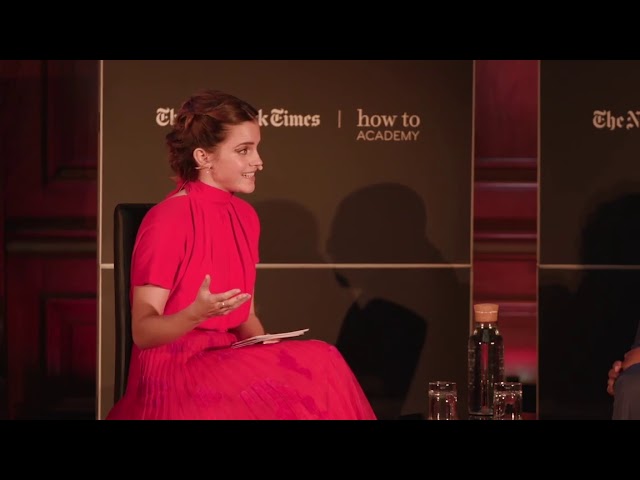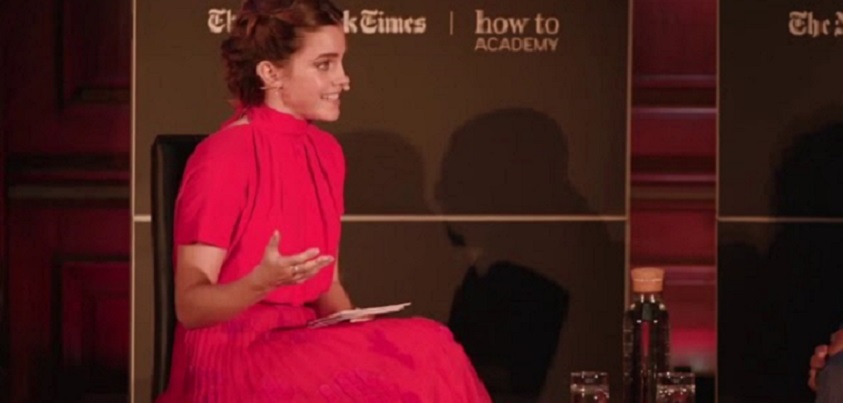2018年ノーベル平和賞を受けた人権活動家で医師のデニ・ムクウェゲさん。その信念について、ジェンダー問題に積極的に取り組む女優エマ・ワトソンさんがインタビューしています。エマさん自身の言葉も含めて、ハイライトで勉強しましょう。

YouTubeの「Emma Watson in conversation with Dr. Denis Mukwege 」=Emma Watson Updatesチャンネルより
内戦の続くコンゴ民主共和国で、性暴力の被害にあった女性たちの治療にあたるデニ・ムクウェゲさんは、これまでに4万人以上のレイプサバイバーを治療してきた産婦人科医です。紛争地域での性暴力は、「兵器」として用いられていて(rape as a weapon of war)、夫や子どもの前でレイプする、レイプした後に銃で女性の性器を撃ち抜くといった行為はもはや「テロ」(a form of terrorism)だとデニ医師は話しています。
インタビューの中ほど、エマ・ワトソンさんのこの質問からまず聴き取りを始めましょう。暗殺のターゲットにされ、一度は亡命したデニ医師が、なぜまたコンゴに戻る決意をしたのか。( )の中を書き取ってください。
*このインタビューには字幕がついているので、聴き取りの際は文字を追わず、デニ医師とエマさんの表情に注目して聴いてください。
Emma : But specifically I would ask, you know, how do you find the courage and the ( 1 ) in the face of all of this to just keep going ? You’ve just, it’s remarkable to me that even after this ( 2 ) on your life, you decided to go back to the DRC. You decided to return to Panzi Hospital and continue doing this work. And I’m just astounded by that. Could you talk a little bit about… What ( 3 ) you the strength to make decisions like this and to be able to do this awe-inspiring work ?
特にお聞きしたいのは、このような中で仕事を続けるための勇気と力を、どうしたら見いだせるのかということなんです。あなたの命を奪おうとする企ての後でさえ、あなたはコンゴに戻られる決心をされました。すごいことですよね。パンジー病院に戻ると決意された。それが、私には驚くべきことに思えます。そのことについて少しお話いただけますか? 何があなたに、この畏れを感じるほどの素晴らしいお仕事を続ける力を与えているんでしょうか?
*DRC=(Democratic Republic of the Congo)コンゴ民主共和国
デニ医師の答えの後半を聴いて、( )の中を書き取ってください。
Denis : Coming at the hospital in the condition that I’m ( 4 ) them, most of the time I have impression that they will never stand up again. I have impression that they are destroyed forever. And when you are ( 5 ), you have just impression that you are doing what you have to do, but what will be, the impact on them. So, but let me tell you that I was so surprised to see that when women wake up, they don’t wake up for themselves. Even if they come ( 6 ) in the hospital, or even if you make operation under anesthesia, when they wake up, the first question is “How are my children ? ” “How is my family ? ” ” Where is my husband ? ” And for me, this is really to think about others when you are ( 7 ) and people around you have impression that there is no hope for you, but you’re still thinking about others. This is something that touch me a lot when it come to women and their attitude.
(性暴力を受けた女性たちを)病院に受け入れたときには、多くの場合、この人はもう二度と立ち直れないだろうという印象をもちます。完全に壊されてしまったと。治療をしていても、するべきことをしながらも、この女性はいったいどうなるのだろうと思ってしまうのです。でも、このことはぜひ言わせてください。そんな女性が目を覚ますときには、自分自身のために目覚めるのではないのです。意識を失った状態で病院に来ても、あるいは全身麻酔で手術をしていても、女性たちが目覚めたときの最初の質問は、「子どもたちは大丈夫ですか?」「家族はどうしていますか?」「夫はどこにいますか?」自分が苦しんでいるときに、他の人のことを考える。周りの人が、この女性にはもう希望がないのではないかと考えているようなときに、自分のことではなく他の人のことを思いやる。これが、女性に関して私が最も感動するところなのです。
デニ医師はこの後に続けて、『私は男性も治療していますが、彼らが目覚めて聞くのは、僕の手はどうなる? 私はまた歩けるようになるか? ということです。女性とは全く違う』と話して会場の笑いを誘っていました。そして、『自分のしていることは、女性の果たす役割に比べて、とても小さい。どんな場合でも他の人のことを思いやれる女性の存在が、仕事を続ける力になっている』と語って、会場からは拍手が起こり、エマさんはしばらく言葉が出ないほど感動していました。
※アイデアニュース有料会員(月額300円)限定部分には、聴き取りの答えと解説、エマ・ワトソンさん自身の想いを語った部分の解説を載せています。ぜひご利用ください。質問もお待ちしています。
<有料会員限定部分の小見出し>
■聴き取りの答えと解説
■エマ・ワトソンさんが語った想い
<関連リンク>
●Dr. Denis Mukwege Facebookページ ⇒
https://www.facebook.com/DrDenisMukwege/
●Dr. Denis Mukwege Foundation ホームページ ⇒
https://www.mukwegefoundation.org/story/dr-denis-mukwege/
●Emma Watson Updates Youtubeチャンネル ⇒
https://www.youtube.com/channel/UCZIztDwArSd_hmoLp-bYcuQ
- YouTubeで学ぶ英語:(108)これからもYouTubeで学習を続けてください 2021年12月25日
- YouTubeで学ぶ英語:(107)インドネシア・ジャワ島のスメル火山が噴火 2021年12月11日
- YouTubeで学ぶ英語:(106)性被害告発後の中国テニス選手、真実はどこに 2021年11月27日
※ここから有料会員限定部分です。
■聴き取りの答えと解説
Emma : But specifically I would ask, you know, how do you find the courage and the strength in the face of all of this to just keep going ? You’ve just, it’s remarkable to me that even after this attempt on your life, you decided to go back to the DRC. You decided to return to Panzi Hospital and continue doing this work. And I’m just astounded by that. Could you talk a little bit about… What gave you the strength to make decisions like this and to be able to do this awe-inspiring work ?
1. strength(名)強さ、力 cf. strong (形)
2. attempt(名)試み、企て cf. attempt on someone’s life 人の命を狙った企て
*2012年9月、デニ医師は国連で、コンゴにおけるレイプの実態を報告。その年10月、武装勢力が医師の自宅を襲い、警備員を射殺する事件がおきた。デニ医師は家族をつれてヨーロッパに一時亡命。しかし、そ2013年1月にはパンジー病院に戻って活動を再会。
3. gave(動) giveの過去形 What という疑問代名詞が主語となった疑問文。 What gave you the strength ? 何があなたに強さを与えたのか?
Denis : Coming at the hospital in the condition that I’m receiving them, most of the time I have impression that they will never stand up again. I have impression that they are destroyed forever. And when you are treating, you have just impression that you are doing what you have to do, but what will be, the impact on them. So, but let me tell you that I was so surprised to see that when women wake up, they don’t wake up for themselves. Even if they come unconscious in the hospital, or even if you make operation under anesthesia, when they wake up, the first question is “How are my children ? ” “How is my family ? ” ” Where is my husband ? ” And for me, this is really to think about others when you are suffering and people around you have impression that there is no hope for you, but you’re still thinking about others. This is something that touch me a lot when it come to women and their attitude.
4. receiving(動)receive の進行形 受け入れる、知る
5. treating(動)treat の進行形 治療する、手当てする
6. unconscious(形)意識を失った、意識不明の cf. un-(接頭)否定をあらわす+conscious (形)意識のある、自覚している
7. suffering(動)suffer の進行形 苦しむ、苦痛を感じる
■エマ・ワトソンさんが語った想い
デニ・ムクウェゲさんをmy heroと呼び、その人柄と活動を大いに尊敬しているエマ・ワトソンさん。彼女もまた、男性も女性も平等の権利と機会を持つべきという信念をもち、ジェンダーの平等を求めて活動している女性のひとりです。そんな彼女に、デニ医師が、あなたの意見を聞かせてくださいと語りかけました。その部分のスクリプトと私訳です。ゆっくり聴いて、考えてほしいと思います。
Denis : And what is happening when it comes to sexual violence, especially, I think that everyone can do something to fight against sexual violence. We can’t be indifferent when we know how women who went through rape are suffering. And this is not something very far because when we are talking about rape in conflict, for example, in Europe people have the impression that “oh, it’s happening in Africa. It’s something really far off us, and it’s a culture. ” Even I heard people talking about culture. But this is very wrong to talk about culture when it comes to rape. And I used just to say in Yugoslavia, it’s in Europe. It’s happening in Syria, in Iraq. I was in South Korea. Rape happened with the Japanese army and when I heard women of 90, 90 year-old talking about what happened for them 70 years ago, it was the same language used by girls I’m treating at Pansi 70 years after. And it’s the same in Latin America. So I think that rape is really a question that we should not be indifferent because we are all concerned by this question. And everyone can really think what he can do to make things happen. I’m a surgeon. I’m doing what I can do. Today I’m activist to bring more awareness on this question. And I know that yourself, you are doing a lot. And I would like really if you can address some more, to I see in the room we have many your people. How do you think that we can really help others ? To fight against sexual violence and be really active ?
デニ医師:性的な暴力と闘うということに関して言えば、私は、すべての人にできることがあると思っています。レイプされた女性の苦しみを知れば、無関心でいることはできません。そして、これは、どこか遠くで起きていることではないことを知るべきです。なぜなら、紛争地でのレイプの話をすると、例えばヨーロッパの人々は「ああ、それはアフリカで起きていることでしょう。我々からは遠いところの話。それって向こうの文化なんでしょう」という印象を持っているようです。そう、「文化」という言葉を使う人もいるのです。しかし、レイプを文化などと言うわけにはいきません。ユーゴスラビアでも起きていることですよ、ヨーロッパの国ですよね。シリアで起きています。イラクでも起きています。韓国に行ってきましたが、日本軍もレイプを行っていました。90歳の女性が70年前に自分の身に起きたことを語る言葉は、パンジー病院で私が治療している少女が語る言葉と同じなのです。ラテンアメリカでも同じです。ですから、私は、レイプというのは無関心でいられるような問題ではないと考えているのです。私たち皆に関係がある問題なのです。この問題をどうしたらいいのか、自分にできることは何なのかを考えるべきです。私は外科医ですから、自分にできることをおこなっています。今日、私は活動家としてこの問題に関する意識を広めたいと思って話をしています。エマさん、あなたもいろいろな活動をされていますね。ここにはたくさんの若い人が集まっています。ぜひ、あなたの意見を聞かせてください。どうしたら性的な暴力に対抗し、積極的に活動することができるでしょうか?
Emma: I would echo what you’ve said, which is that it’s very easy to think that this is something that’s just happening in a far, distant, far flung corner of the world that we will never visit or see. In communities that we aren’t part of. But like the most common UN statistic is that I see that this room is mostly full of young women, which will mean that almost 1/3 of the people in this room will experience some form of violence, sexual or otherwise, in their lifetime. That’s the whole of the section of this room. It’s massive. This isn’t an issue that will not touch us. It’s going to, at some point or another which is awful. I think there’s a sort of strange acceptance as women that not feeling safe, not being completely safe in our societies and our communities is just a fact of life. And that’s something that we have to accept. That’s the way of the world. It’s dangerous to be a woman. But I don’t think that we do have to accept that. And I do think that there are other ways that we could live and be. And beyond that, I think we deserve it. We have to demand it. We have to believe that it’s possible. We have to believe in that world. It can’t be a utopia. I suppose that’s what I’d say.
エマ:デニさんがおっしゃったことに共鳴しています。どこか遠いところで起きていることだと考えると楽なのです。世界の片隅、自分が言ったり見たりすることのない場所で起きていることだと考えれば。しかし、女性の1/3はその一生の間に、性的もしくは別の何らかの暴力を受けるという国連の統計があります。ここはほとんどの人が若い女性ですから、この部屋にいる1/3の人が、ちょうどこのセクションの人全員がそういう経験をするのです。これは大変なことです。私たちと関係のない事柄ではないのです。いつか、どこかの時点でそのようなことが起きると考えると恐ろしいです。「不安をおぼえることや、完全に安全だと思えないことが人生の現実だ、当たり前だ」という奇妙なあきらめの境地が、女性にはあるのではないかと思うのです。そういう不安を受けれなければならないと思っている。「それがこの世界の在り様なのだ。女性であることは危険と隣り合わせということだ」というふうに。でも、私はそうは思いません。受けれなくてもいいのです。もっと別の生き方や在り様が可能なはずです。もっと言えば、別の在り様こそ女性にふさわしいのだと思うのです。私たちは、別の世界を要求していくべきです。そういう世界があり得るのだと信じるべきです。そんな世界を信じるべきです。それはあり得ないユートピアではないのです。これが私の言いたいことです。
Denis : Good. Good. Thank you. Thank you. 素晴らしい。素晴らしい。ありがとう。ありがとう。
